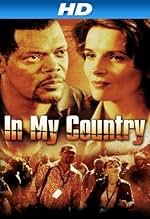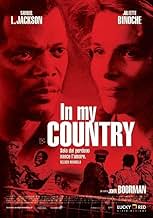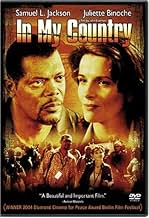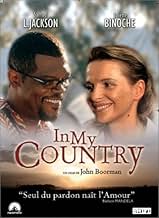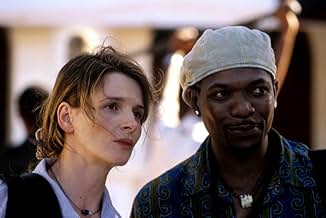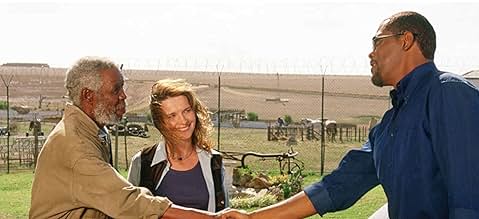A journalist and a poetess meet during the hearings of South African Truth and Reconciliation Commission.A journalist and a poetess meet during the hearings of South African Truth and Reconciliation Commission.A journalist and a poetess meet during the hearings of South African Truth and Reconciliation Commission.
- Awards
- 1 win & 3 nominations total
Menzi Ngubane
- Dumi Mkhalipi
- (as Menzi 'Ngubs' Ngubane)
Harriet Lenabe
- Albertina Sobandla
- (as Harriet Manamela)
Dan Robbertse
- Sgt. de Smidt
- (as Daniel Robbertse)
- Director
- Writers
- All cast & crew
- Production, box office & more at IMDbPro
Storyline
Did you know
- TriviaAfter seeing this film Nelson Mandela called it, "a beautiful and important film about South Africa's Truth and Reconciliation Commission. It will engage and influence not only South Africans, but people all over the world concerned with the great questions of human reconciliation, forgiveness, and tolerance."
- GoofsAll number plates on vehicles throughout the film (apart from archival footage) are fake and do not follow the format of older South African number plates.
- Quotes
Anna Malan: [last lines - voiceover] Because of you, this land no longer lies between us but within. It breathes becalmed, after being wounded in its wondrous throat. In the cradle of my skulll it sings, it ignites my tongue. Five thousand stories are scorched on your skin. I am changed forever.. I want to say, forgive me, forgive me, forgive me.
- ConnectionsEdited into In My Country: Deleted Scenes (2005)
- SoundtracksSenzenina
Arranged by Murray Anderson & Warrick Swinney
Performed by Princess Soi-Soi Gqeza, Mxolisi Mayekane, Mandia Lande, Michael Ludonga, Simpiwe Matole & The New Teenage Gospel Choir
Published by Hi-Z Sound
Featured review
It's a shame that I didn't get the emotional punch I felt as if I was supposed to have when watching In My Country, Country of my Skull to many others. You cannot force emotion and you cannot force an opinion on a film so whilst In My Country is nicely unfolded and is visually engaging for what it is, the fact that some people are pouring their hearts out in apparent regret at various points over horrific prior activity and I'm not feeling the pinch, I suppose you have to consider the film a minor failure.
But why is it that In My Country doesn't pack the necessary heat to make one identify and feel upset for the characters on screen? I think a lot of it is down to the overall approach director John Boorman adopts. The film feels like several things at once rather than an actual case-study of post-Apartheid era events that will change and affect lives just as lives were changed and affected during the era. You might argue that the best way to tackle historical issues that deal with human cruelty to other humans is to set whatever story or narrative you're doing during the actual time thus giving a first hand account of what went down and how. Many films have done this in the past but films such as The Pianist and perhaps more notably The Deer Hunter are so vast in their scale that they manage to cover life prior to 'the event'; the event(s) themselves and then the aftermath of it all through either escape or returning to their former lives before 'the event'.
Interestingly, both those films look at prisoner of war scenarios, Jews to the Nazis and Americans to the Vietnamese, respectively. In My Country is more a look at what happens after 'the event', that being the Apartheid and all the atrocities that befell South Africa midway through the twentieth century. Trouble here is that the best the rest of the world can do here is show up, look glum at a couple of press conferences in which South African men of the law admit what they did and then report on the confessions, something that one character cannot even get much space for in his respective newspaper.
As a film alone, In My Country works as a re-telling of events that happened after an atrocity but it never delves deep into its subject matter. The Apartheid and the people involved in the Apartheid are not the central characters in fact they are relegated to giving accounts at timely spaced intervals throughout the film that hope to produce the odd tear from the audience. Families of the victims bursting into tears and music native to Africa that balres up try to add to the emotion felt in these scenes. But that's about as good as it gets with the rest of it crossing genres in and out of romance, historical, melodrama and the overall approach that gets tangled up that is the docu-drama.
At its very centre, In My Country has an American journalist named Langston Whitfield (Jackson) travelling to a country to cover events few people will have an interest in. It's interesting that a film dealing with the post-Apartheid era would have an American at its core as the lead male and not a South African. There is a South African lead of sorts but they are female and they are pulled up by Whitfield on more than one occasion about the treatment they gave the black inhabitants of the nation. Here there is a confused triangle of conflict; Whitfield is American and complains about Anna Malan's (Binoche) nation's treatment of blacks but as an American he could be read into as representing America, a powerful nation that did nothing about the Apartheid anyway. Then there is the fact Whitfield is black himself and his beef with Malan's nation's treatment of blacks could just be something personal.
The fact Malan is female in the first place immediately relegates her from what she would have been had the character been male. As a male, Malan would have made a good foil for Whitfield and the personal prejudice might not have existed as much. It's no secret that women in films have always been lowered somewhat when pitted against men indeed theorists have argued that all films are shot for the male audience in mind so women view things through a male perspective when watching a film. But the fact sexual tension is present in the film between these two adds another layer of confusion and opens up the possibility that the film could fall into the romance as well as the, shock, 'buddy' genre. They fit the bill in the sense they are binary opposites to one another (black/white; male/female; American/South African, etc.) and rebound dialogue off one another but is there really space for 'buddy' content in a film about post-Apartheid South Africa?
Twinned with this, there are other sloppy instances that aid the film in its mediocrity. When we first get an introduction of any sorts of chief villain De Jager (Gleeson), it is a visit to his house at night; complete with eerie music and we see a lot of animal heads on his wall he must be a baddie. As well as this clumsy labelling, De Jager's press conference right nearer the end does not act as the final moral catalyst for the film but rather as a plot point for Anna's family to ultimately fall apart which was unfortunate. While it's all nicely unfolded and cute for what it is, In My Country bogs itself down with confused studies and feels like a missed opportunity.
But why is it that In My Country doesn't pack the necessary heat to make one identify and feel upset for the characters on screen? I think a lot of it is down to the overall approach director John Boorman adopts. The film feels like several things at once rather than an actual case-study of post-Apartheid era events that will change and affect lives just as lives were changed and affected during the era. You might argue that the best way to tackle historical issues that deal with human cruelty to other humans is to set whatever story or narrative you're doing during the actual time thus giving a first hand account of what went down and how. Many films have done this in the past but films such as The Pianist and perhaps more notably The Deer Hunter are so vast in their scale that they manage to cover life prior to 'the event'; the event(s) themselves and then the aftermath of it all through either escape or returning to their former lives before 'the event'.
Interestingly, both those films look at prisoner of war scenarios, Jews to the Nazis and Americans to the Vietnamese, respectively. In My Country is more a look at what happens after 'the event', that being the Apartheid and all the atrocities that befell South Africa midway through the twentieth century. Trouble here is that the best the rest of the world can do here is show up, look glum at a couple of press conferences in which South African men of the law admit what they did and then report on the confessions, something that one character cannot even get much space for in his respective newspaper.
As a film alone, In My Country works as a re-telling of events that happened after an atrocity but it never delves deep into its subject matter. The Apartheid and the people involved in the Apartheid are not the central characters in fact they are relegated to giving accounts at timely spaced intervals throughout the film that hope to produce the odd tear from the audience. Families of the victims bursting into tears and music native to Africa that balres up try to add to the emotion felt in these scenes. But that's about as good as it gets with the rest of it crossing genres in and out of romance, historical, melodrama and the overall approach that gets tangled up that is the docu-drama.
At its very centre, In My Country has an American journalist named Langston Whitfield (Jackson) travelling to a country to cover events few people will have an interest in. It's interesting that a film dealing with the post-Apartheid era would have an American at its core as the lead male and not a South African. There is a South African lead of sorts but they are female and they are pulled up by Whitfield on more than one occasion about the treatment they gave the black inhabitants of the nation. Here there is a confused triangle of conflict; Whitfield is American and complains about Anna Malan's (Binoche) nation's treatment of blacks but as an American he could be read into as representing America, a powerful nation that did nothing about the Apartheid anyway. Then there is the fact Whitfield is black himself and his beef with Malan's nation's treatment of blacks could just be something personal.
The fact Malan is female in the first place immediately relegates her from what she would have been had the character been male. As a male, Malan would have made a good foil for Whitfield and the personal prejudice might not have existed as much. It's no secret that women in films have always been lowered somewhat when pitted against men indeed theorists have argued that all films are shot for the male audience in mind so women view things through a male perspective when watching a film. But the fact sexual tension is present in the film between these two adds another layer of confusion and opens up the possibility that the film could fall into the romance as well as the, shock, 'buddy' genre. They fit the bill in the sense they are binary opposites to one another (black/white; male/female; American/South African, etc.) and rebound dialogue off one another but is there really space for 'buddy' content in a film about post-Apartheid South Africa?
Twinned with this, there are other sloppy instances that aid the film in its mediocrity. When we first get an introduction of any sorts of chief villain De Jager (Gleeson), it is a visit to his house at night; complete with eerie music and we see a lot of animal heads on his wall he must be a baddie. As well as this clumsy labelling, De Jager's press conference right nearer the end does not act as the final moral catalyst for the film but rather as a plot point for Anna's family to ultimately fall apart which was unfortunate. While it's all nicely unfolded and cute for what it is, In My Country bogs itself down with confused studies and feels like a missed opportunity.
- johnnyboyz
- Sep 24, 2008
- Permalink
- How long is In My Country?Powered by Alexa
Details
- Release date
- Countries of origin
- Official sites
- Languages
- Also known as
- Country of My Skull
- Filming locations
- Production companies
- See more company credits at IMDbPro
Box office
- Budget
- $12,000,000 (estimated)
- Gross US & Canada
- $163,893
- Opening weekend US & Canada
- $22,383
- Mar 13, 2005
- Gross worldwide
- $1,491,434
- Runtime1 hour 45 minutes
- Color
- Sound mix
- Aspect ratio
- 1.85 : 1
Contribute to this page
Suggest an edit or add missing content



